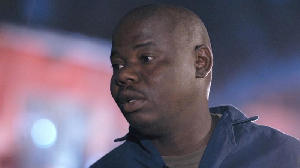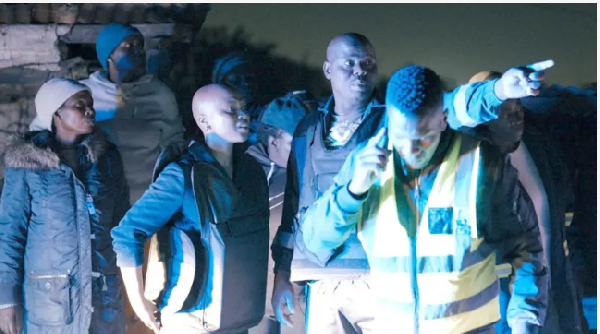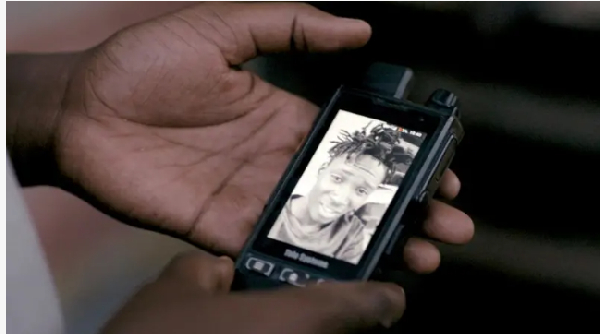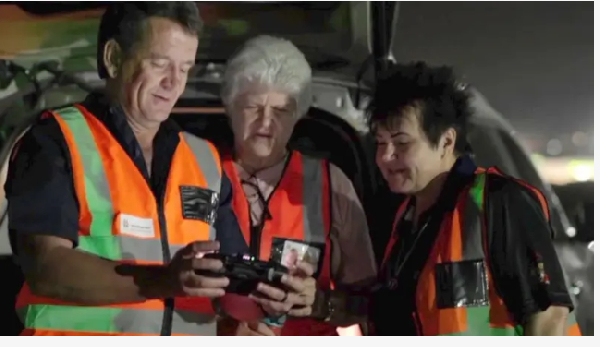 Abel Rapelego says his team of volunteers help protect the community
Abel Rapelego says his team of volunteers help protect the community
Worry about violent crime na im go dey di minds of South Africans as dem dey enta polls vote later dis month, as politicians dey make different promises on how dem go deal wit am.
Wit murder rates at a 20-year high, BBC Africa Eye bin get exclusive access to di frontline communities wey dey fight back.
Loud whistles go off as pipo wey wear yellow and orange hi-vis vests start to dey run.
“Oh God,” pesin shout as one policeman slump for ground. Dem don shoot.
Na Friday night for Diepsloot, one township for di outskirt of Johannesburg - South Africa commercial hub.
“Dis na regular occurrence, ”Abel Rapelego tok. Di 41-year-old dey lead a team of volunteers wey dey patrol di streets each night for night.
Di sirens wey dey blow from one police car scata di crowd wey dey gada.
“Patrollers, comot for road!” Oga Rapelego shout for im team. “Make we give law enforcement time to do dia job.”
Dem carry di police officer, 38-year-old Tom Mashele go hospital but e die a few weeks later. Nobody don dey arrested ova im killing, wey happun wen e dey off-duty.
South Africa get one of di highest murder rates for di world, according to di latest figures from di United Nations Office on Drugs and Crime.
More dan 27,000 murders happun for dia for 2023; wey amount to 45 pipo per 100,000. For comparison, di US rate na six per 100,000.
Wit all dis, Oga Rapelego tok say di only way to keep dia families safe na for volunteers to patrol di communities themselves, even if e mean to risk dia own lives as “Diepsloot dey for di hands of di criminals”.
Di team of volunteers dey work closely wit di municipal police.
Na unofficial arrangement, as some of wetin dem dey do no dey inside constitution. Dem no dey collect salary and dem no dey carry guns. But dem get sjambok, one traditional leather whip.
“We dey do stop and search and if you be criminal and you no wan comply, di sjambok go apply also to you,” Oga Rapelego tok.
Di volunteers no get legal authority to carry out stop-and-search operations, however, di team dey go street by street dey question anyone wey dey out late.
As dem waka pass one shop, di owner say tiff just rob am now-now. Di volunteers manage to catch di man dem see dey run away and search am for di missing phones and money.
Dem beat am wit di sjambok, wey be crime on im own. Evidence no dey say e do anything wrong, so dem let am go.
Wen dem challenge dem on di right dem get to wipe di man koboko, Oga Rapelego defend di use of force, as e tok say: “Remember, Diepsloot na our place and if we no fix our Diepsloot, no-one go fix Diepsloot.”
South Africa crime statistics show say murder victims na young black men, and di volunteers dey also put themselves at risk.
Two years ago, dem shoot and kill 21-year-old Alpha Rikhotso during patrol.
“I dey try to accept di situation but e still dey painful,” im father, David Rikhotso tok.
“E bin dey try to protect im life, my life and everyone. E bin dey fight against crime.”
Im son na di first pesin on di scene wen di volunteers blow dia whistles to alert di group about criminal activity. E manage to catch di man, but dem shoot am for im hand.
E no survive di injury. Just like wetin happun wit di policeman, nobody don ever dey arrested for di killing.
“Every day, dem dey rob pipo. Pipo dey die every day. I pray day and night say [di patrollers] dey safe. Law no dey for dis place,” Oga Rikhotso tell BBC Africa Eye.
Di damage di level of violent crime cause to di economy plenty.
Di World Bank estimate say di cost of South Africa violent crime na almost $40bn (£32bn) - at least 10% of dia GDP every year.
And di problem cut across racial lines, wey remain clearly defined despite di end of di system of legalised racism, wey dey known as apartheid, three decades ago.
Sixty kilometres (37 miles) north-west of Diepsloot, anoda volunteer patrol group dey ready for Brits, one town for North West province.
Na farmers from one group wey dem call Afriforum organise dis one. Dem say dem dey represent di interests of mainly white Afrikaners and dem get more dan 300,000 members nationwide.
Wit pick-up trucks, quad bikes plus drones, dem dey search farms and abandoned buildings throughout di night. Dem say dem dey find stolen goods, wey dem hide to dey picked up later, or anyone wey dey out late wey look suspicious.
Many of dem, like volunteer Dewald van Wyngaardt, dey armed.
“You no fit go gunfight with knife. I no go hesitate to protect my family. If I must fight anoda guy and go hurt me, I no go stand back for am,” e tok.
Di farmers dey take turns to patrol through di night, sometimes four or five times a week. Johan de Klerk, Afriforum neighbourhood and farm watch leader, don dey do dis night watches for di last five years.
“We need to lock up our sheep every night just to make sure you get something to work for tomorrow. E go dey difficult to carry on like dis, because you work a full day and at night you do patrols.”
Attacks on white farmers don receive global attention.
For 2018, President Donald Trump bin post one tweet wey suggest say South African government dey seize land from white farmers, and no be tue. E also cite di “large-scale killing of farmers”.
For July last year, Pretoria-born head of Tesla, Elon Musk, bin add to di narrative for anoda tweet about di opposition Economic Freedom Fighters party, e say: “Dem dey openly push for genocide of white people for South Africa.”
No evidence dey say farmers dey face greater risk pass anyone else.
Statistics show say white South Africans be just over 7% of of di population but dem make up less dan 2% of murder victims, however di fear among di farming community dey real.
“We dey live inside cages and dat dey abnormal. E no suppose be like dis. If one thing fit change for dis whole mata na say make crime just disappear,” Oga De Klerk tok.
Di police no gree say “crime dey for unacceptable levels for some parts of di kontri”, but for inside one statement to di BBC, one police ministry tok-tok pesin tok say “dem don bring in various and very aggressive policing interventions to improve di crime situation".
"E include di mass recruitment drive of 30,000 police officers ova three years." Police budgets don also almost double for 20 years.
But wen e come to some of di actions of di volunteer groups wey BBC Africa Eye follow tok, di tok-tok pesin dey clear say “dem no go accept or tolerate any action outside di law and any member of di community wey resort to taking di law into dia own hands go continue to face di full might of di law".
However, dis fit no stop dem because as crime rates remain high, some pipo across South Africa dey willing to do whatever dem feel e take to protect dia communities.

Di volunteers go stop pipo and question anyone dem tink say dey suspicious

David Rikhotso show picture of im son, Alpha, wey dem shoot dead two years ago

The Afriforum volunteers are on the look-out for what they suspect might be criminal behaviour